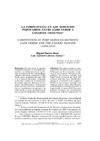Please use this identifier to cite or link to this item:
https://accedacris.ulpgc.es/jspui/handle/10553/58674
| Title: | La competencia en los servicios portuarios entre Cabo Verde y Canarias (1850-1914) | Other Titles: | Competition in port services between Cape Verde and the Canary Islands (1850-1914) | Authors: | Suárez Bosa, Miguel Cabrera Armas, Luis Gabriel |
UNESCO Clasification: | 55 Historia | Keywords: | Islas Puerto Renta de situación Instituciones Empresa, et al |
Issue Date: | 2012 | Journal: | Anuario de Estudios Atlánticos | Abstract: | En este texto se analiza comparativamente la actividad portuaria y su influencia en la evolución económica de dos archipiélagos atlántico-africanos, Canarias y Cabo Verde, entre mediados del siglo XIX y la I Guerra Mundial, tomando como hilo conductor el suministro de carbón mineral. Mientras en Canarias las libertades comerciales junto con otros factores, contribuyeron al crecimiento económico, en Cabo Verde, a pesar de disponer de una situación geográfica favorable, el marco institucional y los oligopolios en los principales servicios portuarios dificultaron ese crecimiento. La situación geográfica o renta de situación es un factor importante pero no suficiente para explicar el desenvolvimiento económico de las regiones insulares. También ha de tenerse en cuenta la expansión económica internacional y su relación con la actividad en los puertos insulares, la regulación institucional y las empresas que operan en los puertos, especialmente las encargadas de suministro de combustible y otros servicios. This paper analyses comparatively the port activity and its influence on the economic evolution of two Atlantic African archipelagos, the Canary Islands and Cape Verde, between the mid -19th century and the First World War, taking as a leitmotif coal supplies. While in the Canary Islands free trade as well as some other factors, contributed to economic growth, in Cape Verde, in spite of the fine geographic location, the institutional framework and the oligopolies in the main port services made the growth difficult. The payoff of the geographic situation is a significant factor but not enough to explain the economic development of the islands. It is also important to bare in mind the international economic development and its connection to the activity in the island ports, the institutional regulations and the companies that work in the port, especially those in charge of the fuel supply and some other services. |
URI: | https://accedacris.ulpgc.es/handle/10553/58674 | ISSN: | 0570-4065 | Source: | Anuario de Estudios Atlánticos [ISSN 0570-4065] (58), p. 363-414 | URL: | http://dialnet.unirioja.es/servlet/articulo?codigo=3986499 |
| Appears in Collections: | Artículos |
Page view(s) 5
225
checked on Aug 31, 2024
Download(s)
188
checked on Aug 31, 2024
Google ScholarTM
Check
Share
Export metadata
Items in accedaCRIS are protected by copyright, with all rights reserved, unless otherwise indicated.
